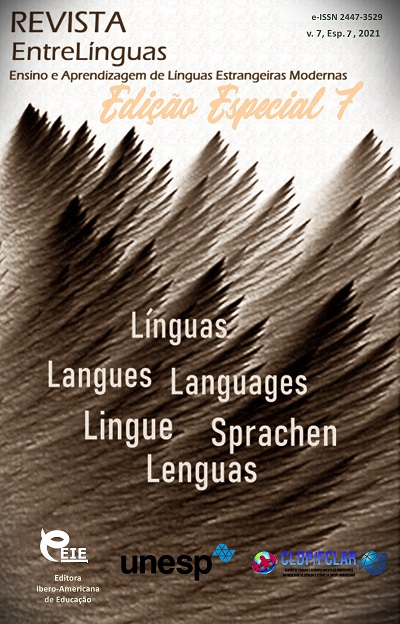Translation and linguistics
DOI:
https://doi.org/10.29051/el.v7iesp.7.16311Keywords:
Translation, Cognitive operations, Grammar, SemanticsAbstract
In the seemingly easy process of translation, complex cognitive operations occur. To decipher the meaning of the source text, the translator must interpret and analyze all the features of the text. A process that requires an in-depth knowledge of grammar, syntax, semantics, and idioms from the reference language should also know the culture of the speakers of that language. Translation theorists generally believe that translation is a subjective, complex, conscious, and purposeful activity. In all stages of translation, the translator's verbal choices - including the style of expression, choice of words, choice of different interpretations, use of different combinations, and the like - all affect the translation in some way. In this article, the relationship between linguistics and translation is investigated by descriptive method and using library resources, including the sources of linguistics and translation. This article discusses the history of translation and the characteristics of a good translator.
Downloads
References
Abdulaeva, P. Z., & Osmanov, A. A. (2017). Medical Errors: Civil and Criminal Liability for Causing Harm When Providing Medical Care. European Journal of Natural History, 4, 31–32.
Bookman, K., & Zane, R. D. (2020). Surviving a Medical Malpractice Lawsuit. Emergency Medicine Clinics, 38(2), 539–548.
Borodinova, T. G., Petrikina, A. A., Borodinov, V. V., & Gubko, I. V. (2020). Topical Issues of Interpretation of the Criminal Procedure Norms on the Basis of Judicial Practice Taking into Account the International and Russian Components. Academic Journal of Interdisciplinary Studies, 9(3), 46–46.
Danshyn, M., Bezpalova, O., Kostenko, M., Denysov, S., & Denysova, T. (2019). Iatrogenic Crimes: Issues of The Investigation Technique. Georgian Medical News, 290, 163–170.
Derbisbekova, A. (2018). Emergencies with Human Casualties and Defects In The Provision Of Medical Care In The Republic Of Kazakhstan. Asian Journal of Pharmaceutics (AJP): Free Full Text Articles from Asian J Pharm, 12(01).
Erin, C. A., & Ost, S. (2007). The criminal justice system and health care. Oxford University Press, USA.
Iedema, R. A. M., Jorm, C., Long, D., Braithwaite, J., Travaglia, J., & Westbrook, M. (2006). Turning the medical gaze in upon itself: Root cause analysis and the investigation of clinical error. Social Science & Medicine, 62(7), 1605–1615.
Irwin, A., & Weidmann, A. E. (2015). A mixed methods investigation into the use of non-technical skills by community and hospital pharmacists. Research in Social and Administrative Pharmacy, 11(5), 675–685.
Kapustina, M. V. (2018). Organizational and Legal Issues of Documents Survey Performing While Iatrogenic Crime Investigation. Theory and Practice of Forensic Science and Criminalistics, 18, 90–98.
Mello, M. M., & Brennan, T. A. (2001). Deterrence of medical errors: Theory and evidence for malpractice reform. Tex. L. Rev., 80, 1595.
Miletić, V. (2019). Criminal responsibility for medical malpractice in the jurisdictional practice of Serbia. Srpski Arhiv Za Celokupno Lekarstvo, 147(5–6), 380–385.
Pletenetska, A. (2016). Results of Analysis of Commission Forensic Medical Examinations of Kyiv City Clinical Bureau of Forensic Medical Examinations upon Improper Performance of Professional Duties by Medical Workers. Galician Medical Journal, 23(2), 63–66.
Pristanskov, V. D. (2015). Background for Developing of the Forensic Theory of Investigation into Iatrogenic Crimes. Vestnik Saint Petersburg UL, 57.
Rustemova, G. R., & Tazhibayev, B. N. (2015). Medical Criminal Offences in the New Criminal Code of the Republic of Kazakhstan. Asian Social Science, 11(19), 275.
Samuels, A. (1987). Iatrogenic Crime: Medicinal Therapy, Prescribed Drugs, and Criminal Behaviour. Med. Sci. & L., 27, 302.
Talan, M. V., & Dunin, O. N. (2018). Criminal legal significance of medical malpractice. Dilemas Contemporáneos: Educación, Política y Valore, 6(Special).
Taromsari, M. R., Mirkamali, S. A., Delpasand, K., Pourhabibi, Z., & Hafezi, M. (2018). Criminological Analysis of Medical Crimes in Isfahan Province in Iran. Journal of Research in Medical and Dental Science, 6(5), 372–376.
Downloads
Published
How to Cite
Issue
Section
License

This work is licensed under a Creative Commons Attribution-NonCommercial-ShareAlike 4.0 International License.
Os manuscritos aceitos e publicados são de propriedade da Revista EntreLínguas. Os artigos publicados e as referências citadas na Revista EntreLínguas são de inteira responsabilidade de seus autores.
Transferência de direitos autorais – autorização para publicação
Caso o artigo submetido seja aprovado para publicação, já fica acordado que o(s) autor(es) autoriza(m) a UNESP a reproduzi-lo e publicá-lo na EntreLínguas, entendendo-se os termos “reprodução” e “publicação” conforme definição respectivamente dos incisos VI e I do artigo 5° da Lei 9610/98. O artigo poderá ser acessado pela rede mundial de computadores (Internet), sendo permitidas, a título gratuito, a consulta e a reprodução de exemplar do artigo para uso próprio de quem a consulta, desde que haja a citação ao texto consultado. Essa autorização de publicação 328 EntreLínguas, Araraquara, v. 1, n .2, p. 323-328, jul./dez. 2015 não tem limitação de tempo, ficando a UNESP responsável pela manutenção da identificação do(s) autor(es) do artigo. Os artigos publicados e as referências citadas na Revista EntreLínguas são de inteira responsabilidade de seus autores.











